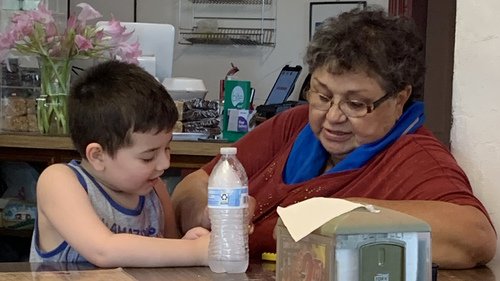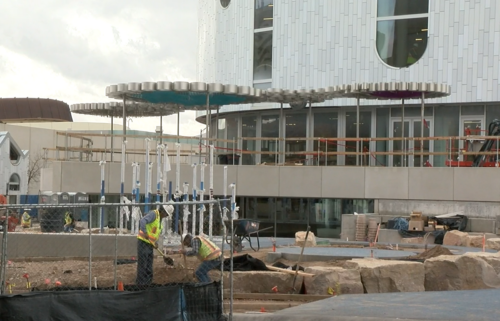Farewell to beloved barbecue and the pre-pandemic memories of a family business

There may have a been a time when the parking lot of The Red Barn BBQ was in fine form, but I don’t remember it.
What I do remember is that the tires of our family’s Chevy Suburban would always kick up a lot of paint-chipping loose gravel when we’d drive up to the restaurant. But what else was to be expected from a surface that had endured years of wear from hungry patrons who drive Texas-sized pickups?
When I became heel-wearing age, the short trek from the pot-holed parking lot to the two-story establishment — not a barn, admittedly — became even more treacherous. But let me be clear: I’d traverse 50 miles of perilous pebbles in five-inch stilettos if it meant getting any closer to the smell that hit my nose the moment we’d open the car door.
The Red Barn BBQ may not have the notoriety of some other Texas barbecue institutions, particularly those in metro areas such as Austin or Houston, but it certainly deserved it.
It served up all the staples — fall-off-the-bone ribs, savory sausage, perfectly charred chicken covered in caramelized crispy bits, brisket so soft you could feed it to a very lucky 1-year-old with still-emerging teeth.
Its location — about 10 minutes from the southern border of the United States with Mexico — heavily influenced the complements to the smokey stars of the show with classic sides such as potato salad along those with a Tex-Mex flare, such as Mexican-style rice, soupy charro beans and warm flour or corn tortillas. (All recipes from the owners’ mother, Felicitas.)
The cuisine was so synonymous with my upbringing in McAllen, Texas, I don’t recall the first time I ate it.
Unfortunately, because of coronavirus and the beloved barbecue spot’s now-permanent closure, a sad fate befalling family-owned businesses across the country, I will never forget the last time.
Precious Red Barn memories
My then-fiancé and my future mother-in-law were in town to spend time with my family, and the natural pick for such a special meal was the place that my family had visited for hundreds of meals.
Over the years, the dining room, which had posters of people such as the late singers Selena and Elvis Presley lording over it, had been home to graduation dinners, anniversary parties, birthdays and going-away bashes.
This is not a unique tale.
Hundreds of saddened diners expressed in the comments of the June 23 Facebook post announcing the restaurant’s closure. They’re not being dramatic. At a time when the human toll of coronavirus is very much an open wound, the loss of places such as Red Barn BBQ, which united communities and families, is an added reminder of the loss we have seen at every turn during the four-month-and-counting fight.
Hopefully not lost amid the conversations about businesses permanently closed because of the pandemic is how much they meant to their owners, too.
How it all got started
The Red Barn began as a to-go restaurant in 1982 that ran out of a small, red structure about a quarter mile north from the location they’d call home for the majority of their nearly four decades in business, co-owners Juan and Tomas Villarreal told CNN.
Juan Villarreal, his father and his uncle had built it with their own hands.
A large hospital and several medical buildings now sit where once was nothing but horses, cows, pastures and orange and grapefruit groves, Juan Villarreal told CNN. The first incarnation of The Red Barn didn’t even have electricity.
Still, it was a success in an area where Mexican restaurants ruled and excellent barbecue was harder to find.
They moved to a larger location in the mid-’90s to keep up with the demand, and the family spirit that powered its beginning also helped it thrive at its height.
Family members relocated from Michigan to help and moved into tight quarters to do so. (Juan and Tomas Villarreal grew up in the Rio Grande Valley, but they ended up spending some of their adults lives in the North, where they used to migrate.)
At one point, almost their entire immediate family — nine people in total — lived on the property that housed The Red Barn, split between the two-story building that housed the dining room and a small white house that was also on the property.
Olivia Villarreal, whose parents owned the restaurant, said her grandparents lived in the small house, her family lived upstairs in the big house, her father’s brother lived in a room downstairs and another of his brothers and his wife were in another. Their other uncle and his wife rented a trailer close to the restaurant.
“Like the Ewings,” Juan Villarreal joked, making a reference to “Dallas.”
Except J.R. Ewing never lived in a hallway next to a commercial kitchen, the smells from which eventually got old, according to Shelly Villarreal, Juan’s wife.
“It was nauseating. It gave me a headache,” she said, laughing.
At their busiest times, the smokers ran 12 hours a day, and they were open seven days a week. In tight-knit communities such as the Rio Grande Valley, where word-of-mouth endorsements are king, The Red Barn was woven into people’s eating routines in a way that made you feel like it was always there and always would be.
The world — and their world — changes
Enter coronavirus.
When the pandemic hit, ingredients became hard to come by, especially the meats for which they were famous, Juan Villarreal said.
Once they were able to find meats, they moved to a curbside pickup model, but business hit a snag as people became more and more concerned about catching the virus, he said.
They are also in their 70s now and “not in good health either.”
Around Easter, they stopped doing curbside service and, ultimately, made the difficult decision to close for good.
“After 38 years, then this thing happens. We had to decide. And it’s time to go,” Juan Villarreal said, his voice breaking.
It wasn’t an easy call.
“We talked about it and talked about it; I don’t think it’s going to work anymore,” Juan Villarreal said. “It’s hard to take, ma’am.”
Had the pandemic not hit, he said, they would have tried to stay open a couple more years. Juan and Tomas Villarreal make vague references to hopes that there might be a “little Red Barn” in the future. But it’s a hard maybe.
Until then, they take pride in the fact that, as Tomas Villarreal put it, they went out like the Dallas Cowboys did in their last appearance in the Super Bowl — on top.
On what turned out to be their last day, they sold out by the early afternoon, much to the disappointment of the line that went out the door.
It was Easter, usually a big day for family gatherings in the largely Catholic area. It’s unclear how the pandemic affected people’s usual plans, but apparently, barbecue had still been on the menu.
I asked the Villarreals if they had a message to families like mine, who, in many ways, considered the dining room of The Red Barn an extension of their own.
“Thank you very much,” Juan Villarreal, pausing, “and we’re going to miss you all.”



